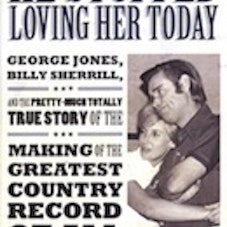The title was an easy choice: He Stopped Loving Her Today. The subtitle (George Jones, Billy Sherrill, and the Pretty-Much Totally True Story of the Making of the Greatest Country Record of All Time) doesn't flow quite as easily, perhaps because of the mythology of the claim. George Jones tells me he didn't even know about the book until I asked his reaction! And, as far as the song being 'the greatest country record of all time,? Jack Isenhour doesn't question the oft-repeated claim let alone properly source it. Had he spoken with me, apparently the only Jones biographer with whom Isenhour did not speak, I would have reminded Jack that the now-defunct Country Music (Magazine) critics? poll was the source one would think Isenhour's University Press of Mississippi editor would have required the author cite. That the poll did not include all of the magazine's writers, me among them (I was a music critic for several local, regional and national country-music publications before bringing my contributions to the music reviews page of this Web site), certainly brings the results into question. But to argue the point one must cite a ?better? alternative and that is a losing game, because opinions, respected and otherwise, are as numerous as- well, you get the idea. That said, there is no disputing, as Charlie McCoy puts it, that "The song is the picture. Everything else is the frame." This, Jack Isenhour's third book, details what Bobby Braddock calls the ?writing, recording, reception and durability of a single solitary,? and as Billy Sherrill adds, ?perfect? composition with the precision one would expect from a West Point graduate. Isenhour is not only that, but a Vietnam veteran (the second-lieutenant and infantryman enlisted), ex-WSM(V)-TV Director of Special Projects and former co-creator/ and executive producer of PBS? Freedom Speaks (produced through the auspices of the Freedom Forum First Amendment Center at Vanderbilt University). He Stopped Loving Her Today... is full of nuggets about the collaboration of co-writers Bobby Braddock and Curly Putman (including the fact that their ownership of the song is not the customary 50/50 split) and the song's producer, Billy Sherrill (a/k/a "the man with the fuzzy balls," to Billy's grandfather, anyway). At points hyped to the hilt (references to 'the 1980 smash hit that saved George Jones? career, if not his life? are not uncommon), Isenhour combines a researcher's skills with the devotion of a smitten fan. But, as with that gushing observation, the research falls short at times such as when Isenhour quotes Frank Sinatra as proclaiming George Jones 'the second-greatest male singer in America? without disclosing Sinatra's top choice. (It was Tony Bennett.) The pattern continues as Jack fails to consider that had 'the 1980 smash? been life-saving (either literally, or figuratively) in the sense that, had George gained a renewed appreciation for his past success, Jones would not have been arrested for (his second) DUI in 1982 nor, 17 years later, would he have engaged in similarly reckless, and potentially suicidal and homicidal behavior as when he crashed his Lexus SUV into a concrete bridge after purchasing a pint of vodka and reaching for something while speaking on his cell phone. Isenhour barely mentions the second incident in his book. But as prospective readers argue ?Why should he? This book is about the creation of a hit song, rendering most everything else irrelevant,? it is important to realize that in order to fill a short, 185-page book (not including nearly 10 pages of sources and a 13-page index) about a single song, no matter how arguably great, Jack goes out on several tangents, be they Nudie Cohn's Jewishness or the rise of Todd Storz and rock radio. Most troubling of these, given the Possum's history with the judicial system, is Jones? cozy relationship with Davidson County's Sheriff Daron Hall and (former) General Sessions Judge John Brown, George's backstage pass buddies. Of course, music historians don't begrudge any such analytical asides (and there have to be many in even such a short book as this, after dissecting a single song from every possible angle- even if one subscribes to Jones? belief that his ?40-year career? was 'salvaged by a three-minute song.? (Or, as Isenhour is quick to add, ?Three minutes, fifteen seconds to be exact.?) Songwriters will especially appreciate the references to technique, such as observations of the execution of He Stopped Loving Her Today, specifically how the third person omniscient references in the narrative switch to the first person while the verses maintain the ABAB rhyme scheme. Perhaps this book's paperback edition will properly identify Earl ?Peanut? Montgomery and John Lentz (identified here as Tammy Wynette's attorney, but who, for purposes of Jack's book, should also have been acknowledged as George Jones? former manager). And I'm sure the late Glenn Sutton's family will also appreciate the correct spelling of his name .





